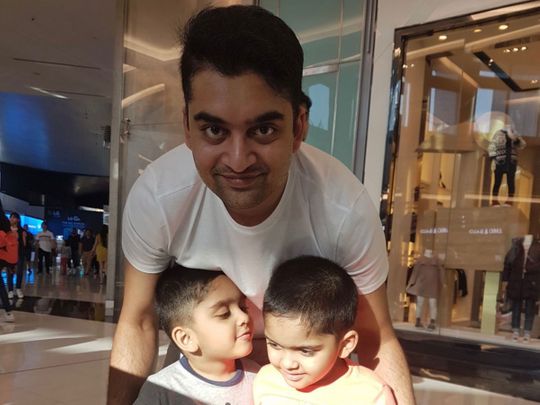
The World Health Organisation (WHO) estimates that about 1 in every 160 children worldwide is on the Autism Spectrum Disorder spectrum. Ambreen Suhaib, who has three children, two of whom are on the spectrum, believes there’s a sort of reverse sexism when it comes to talking about parents of kids with special needs. Mums, she argues, are lauded for their selflessness while the dad’s sacrifices tend to fade into the shadows. Here’s her open letter to the world:
Has you ever noticed how the world gets emotional when talking about motherhood? They say, ‘Mothers are the leading force of the family’, 'Mothers light the path for their children’. I say, a father is the unsung hero of the family.
Over the past eight years, since our twins were first diagnosed with autism, I’ve seen my husband’s strength first-hand. While I talk about my problems and fears to friends and family, he silently absorbs the pain.
Eight years ago, when I first heard the diagnosis, I was shattered, and called my parents and siblings to cry; to talk about how life would be with multiples on the autism spectrum. He kept quiet at first, then said, ‘Worrying won’t help anything; we must focus on how we can help them.’ I remember my husband telling me that he doesn’t care if his kids have autism – he will love them regardless. And I still remember how my eyes welled up when I heard those words: a bittersweet relief.
I’ve never seen him cry or rage when talking about our reality – sometimes I wonder, ‘How could he not?’ A year after the diagnosis, he developed diabetes; his psoriasis, a skin conditioned triggered by stress, worsened. That is when I realised that fathers like him are screaming inside but feel they must stay composed.
Mums who are raising special children have support – from other mums in the same boat, support groups and even family – but what about the dads? I wish there were support groups for special fathers too. To ‘typical’ men, please be a little more generous with those friends who have special kids at home, ask them if they are okay or if they would like to hang out.
Selflessness
Sometimes, I feel selfish; when my husband comes back from office I am all set to tell him how out of control the kids were, how I managed to cook food. And I am ready to ask, ‘Can we take them out after dinner?’; ‘Can we get them new toys to keep them engaged?’; ‘Can you keep them now so I can take a nap or go to gym?’ Most of the time he says yes without telling me that he’s had a tough time at work too, or that he’s tired.
We both used to love to shop but after the immense financial pressure that comes with taking care of kids on the spectrum, he took a step back – without asking me to curb my spending. I know many friends who are in a similar situation.
When we finally get to socialise – our options are limited – I often see a division of the sexes: the mums talk; the dads walk… after their kids, looking out for them, being careful that they are safe at all times. It melts my heart each time.

As mothers we take so much pride in what we are doing for our kids and how beautifully we manage the house, work and the kids. I think we forget to give credit to our husbands like that. They manage work, finances, kids, home and everything else, too. They are constantly brainstorming about how they can give more to the family while being there for their children.
I must commend my husband’s patience too. There are times I’ve told him, ‘No, they don’t do it like this...you don’t know how therapy works’. But fathers have their own ways to connect with their children. My twins have few words but the way their eyes shine when they see their father sometimes makes me jealous.
As mothers we take so much pride in what we are doing for our kids and how beautifully we manage the house, work and the kids. I think we forget to give credit to our husbands like that. They manage work, finances, kids, home and everything else, too. They are constantly brainstorming about how they can give more to the family while being there for their children.
And to mums like me, no matter how many differences you have with your partner while you are raising a special child, remember it’s team work. Life with a special child is a difficult journey and only if both partners are in a good mental and physical space will things be manageable.
Communication is key. If he is not talkative, you must be, because someone has to talk about it.
Give him space, he has a lot on his shoulders too so don’t take offense.
On weekends try to have family time.
Stop worrying about him not being expressive. It could just be his nature.
Read between the lines: I think it’s inbuilt in most of us to receive acknowledgement for the things we do. I was no different until after our children’s diagnosis. I saw a different side to my husband. All I could see every day was a father working tirelessly to provide to his typical child and cater to the needs of his atypical multiples. From being awake all night due to coping with sleep issues with our special twins to getting up early next morning and working all day as if everything is just normal.
Raising kids is expensive; raising kids on the spectrum is even more financially draining. I remember relatives telling us to not spend a hefty amount on a ‘special school’ but to save instead or invest somewhere but it was the resilience of the twins’ father to get them the best of everything because he always said, ‘Why treat them different?’ They are just like any other child who deserve the best of everything.
My father used to tell me that fathers will never tell you how much they love you, they will show it. It’s true. And I am so proud to say thank you. Thank you for being there all these years taking care of the kids and me. Thank you for suppressing your wishes in order to fulfil the demands of our kids. Thank you for taking them out even when you were sick but knew it’s part of their routine. May my kids' smiles keep shining because of you. Thank you for telling me every day that being autistic doesn’t make them any different and they are as special as any other child.
To all the special fathers out there, thank you for what you are doing and this world owes you more respect, love and care. Thank you.
Help yourself to help your family
Perhaps unsurprisingly, these days more and more studies point to a parent’s moods – affected by mental or physical stimuli – brushing off on a child. In the case of a child of determination and the demands the care entails, how can you maintain equilibrium? How do you juggle the physical, emotional, social, and financial challenges – and stay happy?
Minahil Kamran, psychologist and instructor at Ras Al Khaimah-based Harvest Private School, has worked with a number of such children and their parents. She suggests these tips for mums and dads
Find your community: It's critical to find your group. Feelings of isolation are a major source of stress for parents of children with special needs. It's critical to keep in mind that you're not alone. Finding support – whether online or in person – helps as you connect with others who are going through similar experiences and can empathise.
Ask for help: Some families may find it difficult to enlist the help of others. But, getting physical support from friends and family can help to alleviate the strain of the physically demanding effort of physical care. This will give you some breathing room and space to return rejuvenated and energised.

Some families may find it difficult to enlist the help of others. But, getting physical support from friends and family can help to alleviate the strain of the physically demanding effort of physical care. This will give you some breathing room and space to return rejuvenated and energised.
Seek assistance: Do it for your child's sake. There is still a lot of stigma attached to seeing a therapist for mental health issues. But you wouldn't hesitate to see a doctor if you had the flu or a stomach illness, so don't put off taking care of your mental health. There are a number of different types of therapy that can help.
Psychodynamic therapy: This is the technique that most closely resembles the public image of talk therapy. It can help you comprehend and gain insight into your behaviour, as well as develop appropriate strategies to deal with bad emotions. If you're dealing with loss, excessive anxiety, or fear for your child's future, psychodynamic therapy can be a great way to talk about your worries in a secure environment.
Cognitive behavioural therapy: This is a skills-based approach to talk therapy. In CBT, you and your therapist will work together to:
- identify your specific problems or concerns, and
- integrate strategic approaches in response.
If you're continually overwhelmed by stressful situations, for example, you can acquire relaxation techniques to help you clear your mind and deal with problems as they come.
Counseling for couples: When you're co-parenting a special-needs child, your romantic connection can be the first thing to go as you prioritise your child's needs and put yours on the backburner. Couples’ counseling can provide you with a mutually agreed-upon place to work through tension or conflicts, as well as a chance to reconnect even in the middle of your hectic schedules.
Make ‘me time’ a priority: This may be the most challenging task, as me time diminishes as responsibilities and duties increase. That is why I use the term ‘carving out’ to describe it. Because it resembles the act of creating time that doesn't exist to focus on your physical and emotional wellbeing.
Have a story to share? Write in to parenting@gulfnews.com




